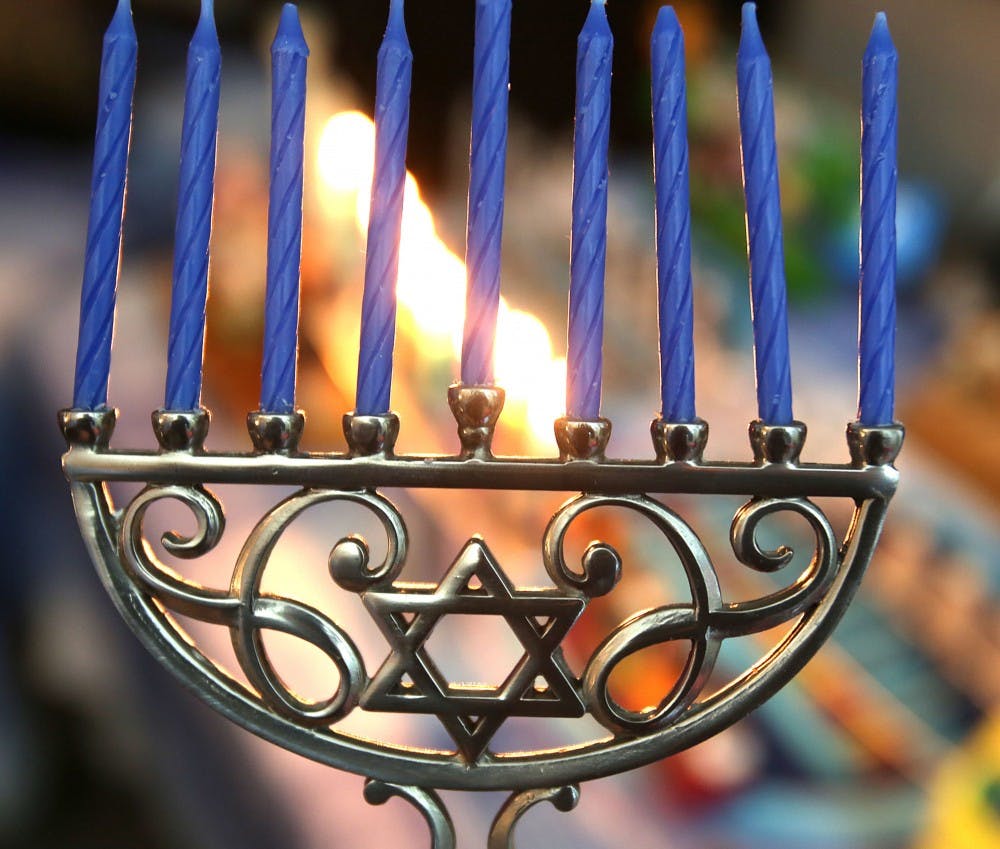For many, December means one thing — Christmastime.
The holiday has evolved to become a part of the American Dream, which includes gifts under a tree, a happy family by the fireplace and a kitchen overflowing with delicacies.
U.S. culture is built to observe one of the quintessential Christian holidays, the birth of Jesus Christ. Already, grocery stores are switching to holiday playlists, Christmas trees are appearing and the Black Friday traffic signifies a month of horrific driving. There’s no denying that the holidays are upon us, all in preparation for Dec. 25.
I, for one, love Christmastime. I like when the Starbucks’ drive-thru line pays it forward, I wish I could wear wool tights year-round and I have a soft spot for twinkly lights and people buying me things. It’s simple — the secular practices associated with Christmas resonate well with good American values like family, charity and thankfulness.
Christmas can be more readily celebrated than other religious holidays in the U.S. because Christians currently account for 70.6 percent of Americans. With about seven of every ten U.S. citizens celebrating Christmas, it makes sense economically to push its marketing value as far as it’ll go. Due to this capitalization, Christmas became more than a Christian birthday celebration and evolved into a concept of holiday joy.
In the U.S., Christmas Day is a federal holiday, meaning that government employees do not work, schools are not in session and many businesses have limited hours. The U.S. government allows church and state to rub shoulders when it comes to Christmas, providing a special perk to celebrating this Christian holiday and thus incentivizing it to become a festival for anyone, religious or not.
With this convenient overlap, Christian holidays are more easily spent with friends and family than other December celebrations, like Ramadan or Hanukkah. Traveling over Christmas is feasible, work schedules are often already aligned to allow for time off and the buildup during the month of December is brought to its climax.
The concept of Christmastime can be understood as a winter month of mistletoe and peppermint mocha or Christmas Mass and Nativity scenes. Regardless, the outcome of celebration is the same. Anyone can recognize the invitation to spend more time with loved ones, show affection and appreciation and remain kind during this season of compassion.
Christmastime is typically a positive, albeit stressful, month and the overwhelming promotion of helping others and showing appreciation is a welcome annual reminder. In the essence of showing kindness and understanding, we should remember that not everyone is looking forward to presents under a tree — people in your classes, offices and teams could also be excited for a plethora of other holidays. Respect is always essential, but especially during the winter season, there is an irony associated with those who only show selective acceptance.
No. I'm Catholic & I'm married to a Jew. I say Happy Hanukkah to her & she says Merry Christmas to me. Pretty easy. https://t.co/YnbVH9XpCZ
— Joe Walsh (@WalshFreedom) November 23, 2015
We’ve all been reminded time and time again that there is more to the holidays than commercials and materialism, and with this in mind, it should be natural to assume that regardless of what people are celebrating, they do it with joy and excitement.
By recognizing a difference between a Christian Christmas and a consumer Christmas, we can view the holiday through the lenses of most Americans. Regardless of what Christmas means to someone, the ideas remain immovable.
In Christianity, the birth of Christ is recounted several times in the Bible, which outlines the story of Mary and Joseph, the wise men, the manger and, finally, baby Jesus. It originally celebrated the birthday of the Son of God, a major factor of the Christian faith.
The season has evolved from the original tale of shepherds and angels to the highly commercialized stories of Santa Claus in a bright red suit, elves and reindeer. Advertising for Christmas nowadays has little to do with Christianity, and instead leans toward the holiday culture that surrounds it.
Many non-Christians still celebrate Christmas, less for its religious meaning and more for the idea of gift giving, holiday parties and pretty decorations. What some people would call the “true meaning of Christmas” is not always relevant, and the festivities trump any religious basis.
Although December is home to days celebrating the cultures, traditions and faiths of many different people, the U.S.’s melting pot roots still end up covered in tinsel.
With this is mind, being cognizant of differing celebrations shows respect and interest in those around you, which seems to be the purpose of the holidays to begin with. Regardless of religious lean, most U.S. citizens will be looking forward to a month of Santa hats and the smell of manufactured pine and peppermint.
Related Links:
Letter: In anticipation of Christmas
Religious freedom is what I'm getting for Christmas
Reach the columnist at smmaki@asu.edu or follow @symmaki on Twitter.
Like The State Press on Facebook and follow @statepress on Twitter.
Editor’s note: The opinions presented in this column are the author’s and do not imply any endorsement from The State Press or its editors.
Want to join the conversation? Send an email to opiniondesk.statepress@gmail.com. Keep letters under 300 words and be sure to include your university affiliation. Anonymity will not be granted.




